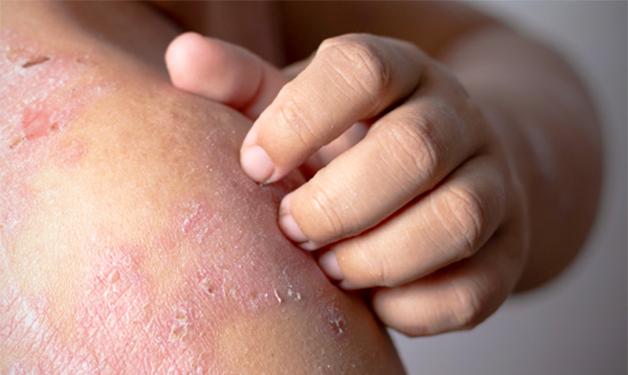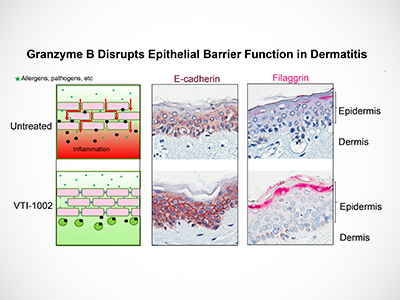
Researchers uncover a novel approach for treating eczema.
Approximately 15-20 per cent of Canadians live with some form of atopic dermatitis (AD), also known as eczema. In a bid to find a better treatment to prevent eczema’s debilitating effects, findings by Vancouver Coastal Health Research Institute (VCHRI) researchers—recently published in the Journal of Investigative Dermatology—have identified a key enzyme that contributes to the condition.
Eczema causes the skin’s protective barrier to break down, making it more vulnerable to foreign entities that can cause itching, inflammation, dryness and further degradation of the skin's protective barrier.
“The symptoms people often experience with eczema make them more likely to avoid going outside their homes or to work,” says VCHRI researcher and study lead, Dr. David Granville.

“It is estimated that the annual cost of eczema in North America is over $5.5 billion because of how it impacts people’s health and well-being.”
Dr. Chris Turner, the study’s first author and a postdoctoral fellow in Granville’s laboratory, found that the Granzyme B enzyme is positively correlated with itchiness and disease severity in eczema. Granzyme B also weakens skin by cleaving through the proteins holding cells together.
“Between cells in our skin are proteins that anchor them tightly together,” says Granville. “In some inflammatory diseases, such as eczema, Granzyme B is secreted by cells and eats away at those proteins, causing these bonds to weaken and the skin to become further inflamed and itchy.”

Researchers found that by knocking out Granzyme B with genetic modification, or inhibiting it with a topical gel, they could prevent it from damaging the skin barrier and significantly reduce the severity of AD.
“Previous work had suggested that Granzyme B levels correlate with the degree of itchiness and disease severity in patients with atopic dermatitis; however, there was no evidence that this enzyme played any causative role,” says Granville.
“Our study provides evidence that topical drugs targeting Granzyme B could be used to treat dermatitis in patients with eczema and other forms of dermatitis.”
Researchers aim to quash the root cause of eczema symptoms
AD affects between 10-15 per cent of Canadian children under age five. Of those, around 40 per cent will experience symptoms of the disease for the rest of their lives1.
It is also associated with an increased risk of developing a host of other inflammatory conditions, including food allergies, asthma and allergic rhinitis, notes Turner.
"Atopic dermatitis is the leading non-fatal health burden attributable to skin diseases.”
AD typically follows an itch-scratch cycle in which itchiness is followed by scratching and more itchiness. This cycle usually occurs during flare-ups, which can appear anytime, and sometimes weeks, months or years apart.

Corticosteroid creams are a common treatment for individuals with AD who experience more severe itching and rashes. However, these can thin the skin when used over a prolonged period of time, which can make skin more prone to damage and infection.
A gel or cream that stops or limits Granzyme B, thereby reducing the severity of AD, could be a safer and more effective long-term treatment, says Turner.
“A gel or cream that blocks Granzyme B could have fewer if any side-effects and circumvent the itch-scratch cycle, making flare-ups less pronounced.”
While a commercially available treatment is still a ways away, Turner and Granville see great promise in this line of research, and are pursuing further clinical trials into Granzyme B and Granzyme B inhibitors.
1 Canadian Skill Patient Alliance - Atopic Dermatitis (Eczema)


